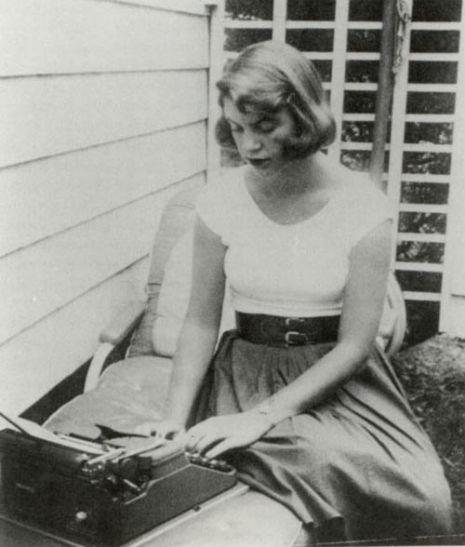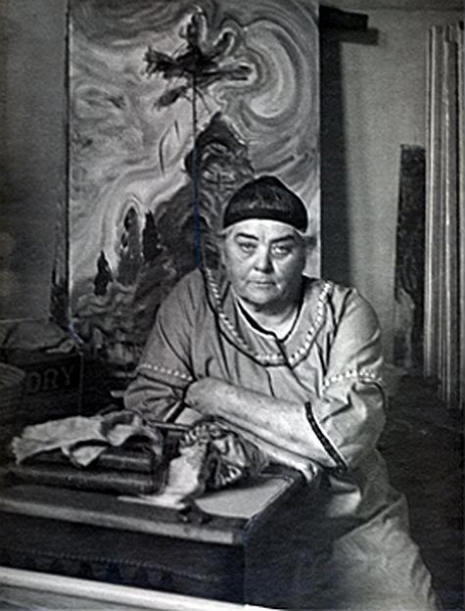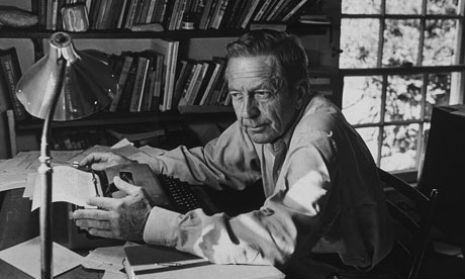
It’s around this time that the enthusiasm started almost a month ago begins to wane, and the pages remain blank, as days dissolve into weeks. Keeping a diary is hard work, but it is rewarding work. If you’ve started a diary and want a little encouragement to keep going, or even just to start writing, then here is a personal selection of diary and journal writers, who may inspire.
Sylvia Plath kept a diary throughout her life, which reveals a world beyond her poetry. Here is Sylvia setting out on her adventures as a writer, from November 13th 1949.
As of today I have decided to keep a diary again - just a place where I can write my thoughts and opinions when I have a moment. Somehow I have to keep and hold the rapture of being seventeen. Every day is so precious I feel infinitely sad at the thought of all this time melting farther and farther away from me as I grow older. Now, now is the perfect time of my life.
In reflecting back upon these last sixteen years, I can see tragedies and happiness, all relative - all unimportant now - fit only to smile upon a bit mistily.
I still do not know myself. Perhaps I never will. But I feel free – unbound by responsibility, I still can come up to my own private room, with my drawings hanging on the walls…and pictures pinned up over my bureau. It is a room suited to me – tailored, uncluttered and peaceful…I love the quiet lines of the furniture, the two bookcases filled with poetry books and fairy tales saved from childhood.
At the present moment I am very happy, sitting at my desk, looking out at the bare trees around the house across the street… Always want to be an observer. I want to be affected by life deeply, but never so blinded that I cannot see my share of existence in a wry, humorous light and mock myself as I mock others.
Playwright Joe Orton filled his diaries with his sexual escapades, and vignettes of the strangeness of the world, from January 18th 1967.
On the bus going home I heard a most fascinating conversation between an old man and woman. “What a thing, though,” the old woman said. “You’d hardly credit it.” “She’s always made a fuss of the whole family, but never me,” the old man said. “Does she have a fire when the young people go to see her?” “Fire?” “She won’t get people seeing her without warmth.” “I know why she’s doing it. Don’t think I don’t,” the old man said. “My sister she said to me, ‘I wish I had your easy life.’ Now that upset me. I was upset by the way she phrased herself. ‘Don’t talk to me like that,’ I said. ‘I’ve only got to get on the phone and ring a certain number,’ I said, ‘to have you stopped.’” “Yes,” the old woman said, “And you can, can’t you?” “Were they always the same?” she said. “When you was a child? Can you throw yourself back? How was they years ago?” “The same,” the old man said. “Wicked, isn’t it?” the old woman said. “Take care, now” she said, as the old man left her. He didn’t say a word but got off the bus looking disgruntled.
Two extracts from Virginia Woolf on the end of the First World War, November 11th 1918.
Twenty-five minutes ago the guns went off, announcing peace. A siren hooted on the river. They are hooting still. A few people ran back to look out of windows. A very cloudy still day, the smoke toppling over heavily towards the east; and that too wearing for a moment a look of something floating, waving, drooping. So far neither bells nor flags, but the wailing of sirens and intermittent guns.
Virginia Woolf, November 15th 1918.
Peace is rapidly dissolving into the light of common day. You can go to London without meeting more than two drunk soldiers; only an occasional crowd blocks the street. But mentally the change is marked too. Instead of feeling that the whole people, willing or not, were concentrated on a single point, one feels now that the whole bunch has burst asunder and flown off with the utmost vigour in different directions. We are once more a nation of individuals.
Derek Jarman’s diaries are always worth reading, a mix of art, film-making, politics, horticulture and biography, here he notes a meeting with a very special reverend, October 17th 1989.
Met Genesis P. Orridge wheeling his daughter Jeunesse in a pram. Gen was dressed immaculately in a grey suit, grey shirt and dog collar, a gold Psychic TV cross on his lapel. He had bought the dog collar and shirt in Brighton from an earnest lady who asked him which parish he was from.
‘I’m a missionary,’ said Gen. ‘I travel the world.’
‘Oh, who do you work for?’
‘Young people,’ said Gen.
‘I do a lot of that sort of thing, gays and the like,’ she said.
Dressed as a bishop he gets put in first class carriages, people help him with the child, taxi drivers cross busy streets, and everywhere he goes people call him Sir.
‘You should try it, Derek, it makes a world of difference.’
Andy Warhol records meeting Steve Jobs at Sean Lennon’s birthday party, October 9th 1984.
We went into Sean’s bedroom―and there was a kid there setting up an apple computer that Sean had gotten as a present, the Macintosh model. I said that once some man had been calling me a lot wanting to give me one, but that I’d never called him back or something, and then the kid looked up and said, “Yeah, that was me. I’m Steve Jobs.” And he looked so young, like a college guy. And he told me that he would still send me one now. And then he gave me a lesson on drawing with it. It only comes in black and white now, but they’ll make it soon in color. And then Keith [Haring] and Kenny [Scharf] used it. Keith had already used it once to make a t-shirt, but Kenny was using it for the first time, and I felt so old and out of it with this young whiz guy right there who’d helped invent it.

The artist, Emily Carr ponders her connection with the universe, January 17th 1936.
Over and over one must ask oneself the question, “What do I want to express? What is the thought behind the saying?What is my ideal, what my objective? What? Why? Why? What?” The subject means little. The arrangement, the design, color, shape, depth, light, space, mood, movement, balance, not one or all of these fills the bill. There is something additional, a breath that draws your breath into its breathing, a heartbeat that pounds on yours, a recognition of the oneness of all things. When you look at your own hand you are not conscious of feeling it (unless it hurts), yet it is all intimately connected up with us. Our life is passing through it. When you really think about your hand you begin to realize its connection, to sense the hum of your own being passing through it. When we look at a piece of the universe we should feel the same.
Nella Last started her diary in 1939, under the auspices of the Mass Observation Unit. The idea was to give government an idea of the day-to-day thoughts, activities and lives of hundreds of different citizens across the UK. Nella, or Housewife 39, kept a diary for nearly thirty years, some of which were published during the past decade, and most recently made into a BBc film with Victoria Wood as Nella. Here are 2 extracts form Nella’s war diary, firstly, January 15th 1941.
I gave Cliff [her son] a very big helping as he had to catch the train back [to his base] after lunch. He said ‘If you ever have to work for a living, Mom, come and cook for the Army’. I said ‘What do you mean - work for my living. I guess a married woman who brings up a family and makes a home, is working jolly hard for her living. And don’t you ever forget it. And don’t get the lordly male attitude that thinking wives are pets - and kept pets at that.’
Nella Last, May 10th 1945.
I love my home dearly but as a home rather than a house. The latter can make a prison and a penance if a woman makes too much of a fetish of cleaning. But I will not go back to the narrowness of my husband’s ‘I don’t want anyone else’s company but yours’.
I looked at his placid blank face and marvelled at the way he had managed so to dominate me for all our married life, at how, to avoid hurting him, I had tried to keep him in a good mood.I know that I’m not the sweet woman I used to be but rather a frayed battered thing, with nerves kept in control by effort that at times became too much and nervous breakdowns were the result. No one would ever give me one again, no one.
I tore the rosy rags Cliff had draped around a few of his illusions. I told him he stood at the crossroads, and if he took the left-hand path, he would end up like my father’s n’er-do-well brother. One thing about him, though, he can ‘take it’. Maybe when he is alone, some of my words will make him think.
The actor Brian Cox documents rehearsals for a year’s tour as King Lear, from March 20th 1990.
I went for a run, trying to build up my stamina for the role, then Sam (Beazley) collected me. We read the play again in the morning. I read Goneril and it has to be said that my Goneril was not as good as my Cordelia.
In the afternoon Deborah (Warner, the director) made us do some exercises with a tambourine: Richard O’Callaghan and I started, which brought back memories of our antics as students together twenty-six years ago, touring one-night stands in Holland. The object of the game was to beat your opponent’s tambourine, while keeping up a rhythm on your own. One hit on theirs and the game is over. After a little time two or three people are introduced to the circle, all trying to beat each other’s tambourines. The result of the game is a manic dance. The most impressive was David Bradley, who played it very much on the back foot, sly and cunning. I found it all a bit competitive - which I’m not sure is a good thing.
We then did some mirror exercises, which were more constructive, A and B sit on chairs facing each other. A starts to mirror B’s movements; on either side of A are C and D; C asks simple mathematical questions which A must answer, D asks A personal questions, which again A must answer - all the time continuing to mirror B’s movements. Ian (McKellen) mirrored me while Bruce Purchase and Colin Hurley asked questions; then we all swopped round. It was quite comic. These games are designed to break down inhibitions and knit the company together in as short a time as possible.
Alan Arnold’s journal on the making of The Empire Strikes Back, gave a first-hand report of the film’s production, August 15th 1979.
From the call sheet today, I note that Ben Kenobi is required. This, to me, implies Sir Alec Guinness. But the call sheet specifies an anonymous double as standing-in for him in today’s shots. So I asked (Gary) Kurtz for an explanation.
“The simple answer is that although Ben is seen on the bog planet, he’s not really there at all,” he replied. Sensing my mystification, he went on: “When Kenobi appears it is a vision, a ghost, an angel - he’s a supernatural image intervening in the dialogue between Luke and Yoda.”
The question, of course, is who will portray Ben Kenobi? Will it be Sir Alec? It is still not known. The distinguished actor, it seems, is recuperating from an eye operation, still pondering over the wisdom of repeating the role that made him - to his as much as anyone’s surprise - an awful lot of money. It also introduced him to millions of people all over the world who previously had never heard of him, despite his many fine films. I am puzzled that it’s Sir Alec’s health that’s the issue because two weeks ago he led a protest march to 10 Downing Street to petition Prime Minister Thatcher to cut the newly imposed taxes on theater seats. There must be an awful lot of force behind the old warrior yet.
Hailed as the man who saved the English stately home, James Lees-Milne was one of the best diarists of the late 20th century, whose mixture of humor, snobbery and incredible knowledge made his volumes of diaries rather addictive reading, from November 14th 1948.
Newman, the hall porter at Brook’s, told me I would be surprised if I knew which members, to his knowledge, stole newspapers out of the Club. I said, ‘You must not tell me,’ so he promptly did. Queen Mary’s equerry, Coke, he says, an old member, steals the Sporting and Dramatic the very morning it comes out. He does it every week and Newman has often watched him.
Soaking in my bath this morning I decided I should not have such hot baths for my body is becoming horribly soft. Of course if one has no features or bone structures one cannot remain handsome after forty. So is it worth bothering about?
Jack Kerouac kept a journal during his writing of On the Road and Doctor Sax, here’s an extract from August 23rd 1948.
Told mother she ought to go live down South with the family instead of spending all her time slaving in shoe factories in order to earn just enough money to spend on the system of expenses that is our society. In Russia they slave for the State, here they slave for expenses. There’s no difference anywhere…people just go rushing off to meaningless jobs day after day, you see them coughing in the subways at dawn, and they never rest, they never relax, they never enjoy life, all they do is “Meet Expenses” - beyond food, they squander their souls on things like “rent,” “decent clothes,” “gas & electricity,” “insurance,” and a million-and-one “decent” appurtenances. Even the birth of a child involves months and months of “pay-money.” Everything “costs money” now.

When John Cheever’s journals were published, they shocked the public and critics alike, for the perceived image of Cheever the writer, was revealed to be nothing more than a carefully manufactured pretense. In some respects, Cheever’s journals are amongst the most important and startlingly honest books published in the last fifty years. Cheever’s journals were not dated, events tumble one after the other in a compelling cascade.
The house was dark, of course. The snow went on falling. The last of the cigarette butts was gone, the gin bottle was empty, even the aspirin supply was exhausted. He went upstairs to the medicine cabinet. The plastic vial that used to contain Miltown still held a few grains, and by wetting his finger he picked these up and ate them. They made no difference. At least we’re alive, he kept saying, at least we’re alive, but without alcohol, heat, aspirin, barbiturates, coffee, and tobacco it seemed to be a living death. At least I can do something, he thought, at least I can distract myself, at least I can take a walk; but when he went to the door he saw the wolves on the lawn.
William Soutar was a poet, who was tragically confined to bed with a crippling illness, during these years he kept a diary of his experiences, thoughts and observations, which were published to great acclaim after his death, this his diary entry for August 26th 1934.
If you ask me why I deem it worth while to fill up a page such as this day by day - shall I not reply, ‘Worth-whileness hasn’t very much to do with it’? The most natural reply might be, ‘Because I cannot go out and chop a basket of firewood or take the weeds out of the garden-path.’ Yet that wouldn’t be a wholly honest answer. We are all sustained at times by the thought that whatever we may be we are certainly a solitary manifestation of creation; not a single other creature in all the history of the world has been just as our self - not another will be like this. Why not put on record something of the world as seen by this lonely ‘ego’: here and there perhaps a sentence may be born whose father is reality.
And now, it’s your turn…